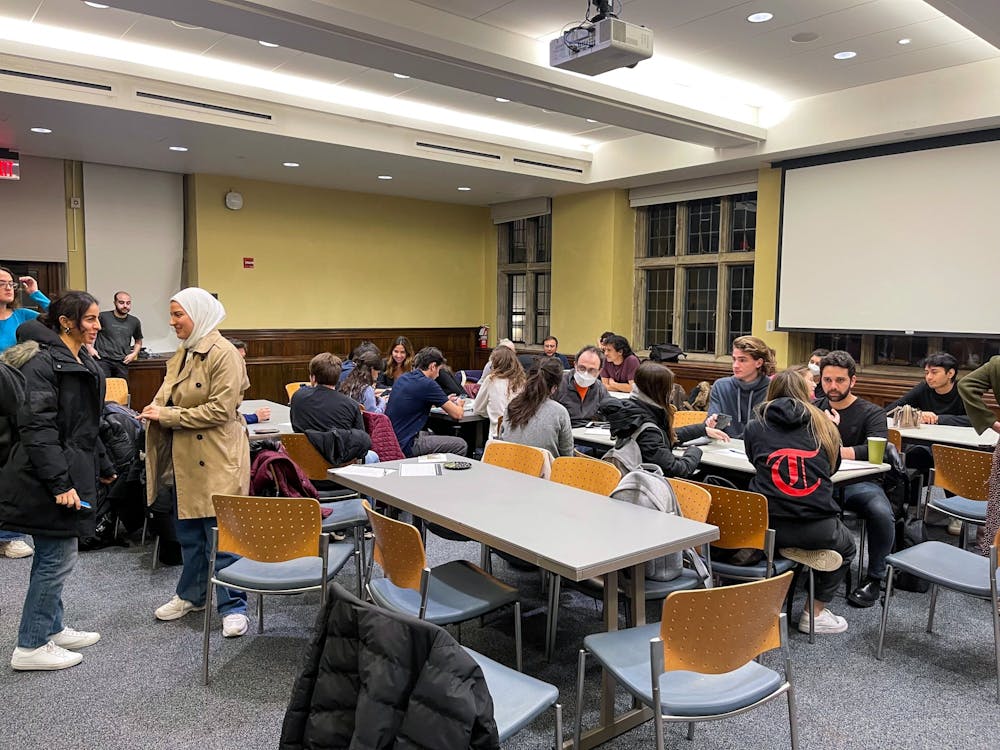Student leaders are organizing relief efforts for victims of the Turkey-Syria earthquakes, which have killed tens of thousands of people.
The Penn Arab Student Society, Fenjan: The Middle East Journal, Penn Muslim Students Association, Penn Afghan Students Association, and Penn Students Against the Occupation are collecting donations to provide immediate relief to survivors. As stated in their joint social media post, donations will be sent to the Syrian American Medical Society, which operates on the ground in Northern Syria, and AKUT, a non-governmental organization providing search and rescue missions across Turkey.
“The destruction is on a scale that I could have never imagined," social media manager for the Penn Arab Student Society and College junior Summer Maher said. "So honestly, the initial reaction was just [that] we have to do something … Just to sit and watch — for so many people involved in this — was not an option."
Other leaders echoed the sentiment that their first response was to organize in an effort to help the affected region.
Co-founder of Fenjan, president of PSO, and College senior Laila Shadid told The Daily Pennsylvanian that she was “shocked and devastated” by the earthquake’s destruction and “immediately wanted to look for ways to raise money and help in whatever way we could.”
Student leaders — who jointly decided to organize the donation drive — promoted it on social media and their organization's respective listservs. The leaders said that the collaboration has helped strengthen their efforts.
“I think especially with a lot of student groups and activism group that the best way to [make a change] is to work together," Muslim Students Association President and Wharton junior Rayane Taroua said.
Coordinating the donation efforts reportedly made it easier for interested students to find someplace reliable to donate money to help the Turkey-Syria earthquake victims.
RELATED:
Penn to host support check-in after earthquakes devastate Turkey, Syria
Penn Middle East Center loses all federal funding, a 'devastating' blow to its future
According to Maher, their donation drive has received support from the Undergraduate Assembly, the College Dean’s Advisory Board, and other organizations. Neighboring universities Drexel University and Temple University have also shared their donation links with their students.
“We have been overjoyed with the response we’ve gotten from grad students to professors,” Maher said.
Penn hosted a support "check-in" for community members at Perry World House on Friday in response to the recent earthquakes. Penn Medicine has also pledged to match donations dollar-for-dollar the first $50,000 in community donations towards Turkey-Syria earthquake relief efforts.
Penn has yet to issue an official statement on the earthquakes or help organize fundraising efforts. In a letter sent to Penn administrators — including President Liz Magill — and signed by Middle East Center Director Harun Küçük, community members petitioned Penn to issue a statement, help in fundraising efforts, and consider matching donations collected through the community effort.
"We are petitioning you for support in these difficult times because the road ahead for these regions is long and arduous," Küçük wrote in the letter. "Many students, faculty, and staff members are ready to help and are already helping on and individual basis with channeling resources to the region. The University's help in supporting these efforts will be invaluable."
Two earthquakes with magnitudes of 7.8 and 7.5 rocked southeastern Turkey and northwestern Syria on Feb. 6. Over 36,000 people have been killed and more than 75,000 people have been injured. Death and injury tolls are expected to increase as international rescue efforts continue.
Despite their relief efforts, student leaders told the DP that they feel that community response has been mixed, citing that students without a connection to the region might be apathetic to the earthquakes.
“I would say that I think a lot of people feel this issue is very removed from them and [in] their lives, especially if they don’t have connections to that region of the world,” Shadid said.
Maher added that although the disaster occurred in a different region, the Turkey-Syria earthquakes are still one of the biggest natural disasters of the century.
“The fact that it didn’t happen here doesn’t mean that it doesn’t affect us because at the end of the day, these are human lives that are at risk and will continue to be at risk because of this for months and years to come,” Maher said.
Taroua agreed with Maher, adding that people often tend to move on to the “next thing” in this era of mass media.
“In the coming months to come, when it’s still not at the top of the news, it’ll still be in our hearts. We still want people to donate," Taroua said. "It’s going to be an ongoing thing … and I want us to keep this momentum going for as long as possible."









